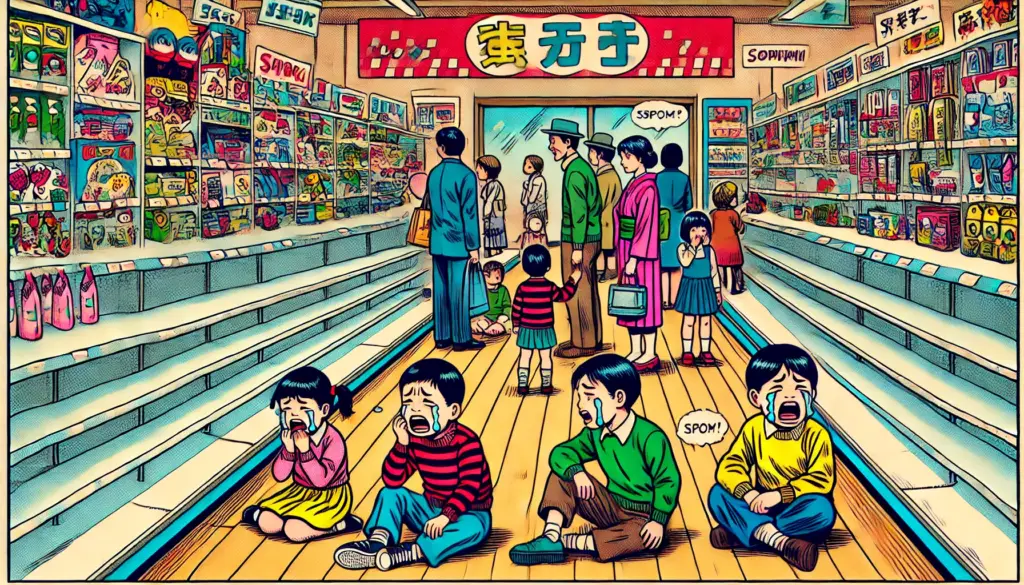
🟢 The Frustration Behind “SOLD OUT” in Seconds
You wake up early, click the “Buy” button the moment sales begin—and yet, it’s already gone. Limited-edition sneakers, concert tickets, gaming consoles, or anime figures: in Japan, these items often disappear within seconds of release, not into the hands of passionate fans, but into the virtual carts of tenbaiya—resellers.
In recent years, this phenomenon has grown into a social flashpoint. Some see it as a natural byproduct of capitalism. Others see it as an unethical disruption of fairness and community. But why do Japanese people react so strongly to resellers compared to other capitalist nations? Let’s dive into the controversy.
🟢 What Is a “Tenbaiya”?
In Japanese, tenbaiya (転売ヤー) refers to individuals who buy goods in bulk with the sole purpose of reselling them at a markup. While the term isn’t new, the practice has exploded in the last decade, largely fueled by automation tools, online marketplaces, and social media hype.
From Pokémon cards to PlayStation consoles, from idol concert tickets to trendy snacks—no category is safe. Some tenbaiya operate full-time, earning stable incomes through strategic bulk-buying and price inflation.
🟢 Why the Practice Thrives
Japan’s capitalist system technically does not prohibit reselling. In fact, with few exceptions (such as ticket scalping laws or pharmaceutical resales), it’s legal.
Reasons this ecosystem continues to grow include:
- Limited supply culture: Japanese products often release in small, exclusive batches to increase brand value.
- High demand from collectors: Fandom culture is intense, and some are willing to pay any price.
- Weak enforcement: Platforms like Mercari, Rakuma, and Yahoo! Auctions do not strictly ban reselling, even of newly released goods.
- Automation tools: Bots make it easy to buy out products in seconds, giving resellers an unfair advantage over the average consumer.
🟢 Public Outrage: More Than Just Economics
While the capitalist defense is, “They bought it fair and square,” Japanese netizens often express deep resentment toward resellers. Why?
- Cultural emphasis on fairness
Japan values order, patience, and equal opportunity. Queuing culture is strong; skipping the line digitally feels just as offensive as doing so physically. - Communal thinking over individual profit
There’s a widespread belief that items should reach those who genuinely want to use them, not those looking for profit. This collectivist mindset clashes with profit-driven motives. - Perception of selfishness
Many see tenbaiya as exploiting both companies and fans. They offer no added value—just inflation. - Impact on enjoyment
Reselling ruins hobbies. Fans of Pokémon or Nintendo, for instance, often give up trying to buy new items due to unfair pricing. That erodes trust in the marketplace.
🟢 Recent Cases Stirring Public Backlash
In 2024 and 2025, several high-profile incidents reignited the debate:
- Nintendo Switch 2 Launch (2025)
The next-gen console sold out instantly, with thousands of units appearing online at double or triple the price. Nintendo eventually responded by increasing supply, but damage to consumer trust lingered. - Chiikawa x Kurazushi Collaboration (2025)
A campaign giving limited plates to customers triggered a reseller rush. Some customers waited in line only to be told that all items had been claimed within hours. The plates appeared immediately online for resale. - Official Goods from Ghibli Park
Exclusive items sold only at the site became hot targets. Fans complained that even tourists with travel expenses couldn’t afford the marked-up prices on resale platforms.
🟢 Is Reselling Really a Crime?
Legally, most resale activities are not crimes. But:
- Some ticket scalping is illegal under the Chikebaibai Kinshi Ho (チケット不正転売禁止法).
- Retailers like Lawson and Seven-Eleven have begun limiting purchases to deter bulk buying.
- Companies like Bandai and Sanrio have created “resale monitoring” teams to flag mass resellers.
Yet, enforcement is slow, and the system is easy to game.
🟢 Voices of the Resellers
Interestingly, many tenbaiya push back against the criticism:
- “It’s supply and demand. I provide a service.”
- “If you really wanted it, you should’ve acted faster.”
- “I’m just smarter with tools and timing.”
Some even argue that they are market stabilizers, helping customers get what they want when retailers underdeliver.
🟢 Unique to Japan? Comparing Global Attitudes
In countries like the U.S. or UK, reselling is widely accepted—especially in sneakers, art, and ticket markets. Bots are common, but so are legal efforts to restrict them (e.g., the BOTS Act in the U.S.).
What’s different in Japan?
- Emphasis on humility and modesty
- Longstanding tradition of queuing and fairness
- Collectivist values that prioritize the group over individual profit
While some Japanese people admire entrepreneurial spirit, many see tenbaiya as violating 道徳 (dōtoku)—the moral code.
🟢 The Future: Solutions or Surrender?
While public anger continues, practical solutions are emerging:
✅ Lottery-based sales: Companies like UNIQLO and Lawson offer random-draw purchases to curb scalping.
✅ Personalized purchase limits: Using ID verification or online memberships to restrict bulk buying.
✅ Direct fan-to-company models: Brands creating pre-order-only systems with longer wait times but guaranteed stock.
However, unless platforms tighten enforcement and consumers stop paying inflated prices, tenbaiya are here to stay.
🟢 Final Thoughts: Villains or Capitalist Ninjas?
Resellers exist because scarcity sells—and in a capitalist system, profit is not a sin. But in Japan, where fairness and community are core social values, tenbaiya are viewed with suspicion and even disgust.
Are they merely opportunists? Or are they a mirror showing us the limits of fairness in a money-driven world?
💡 Either way, the battle between fans and tenbaiya continues—and Japan’s unique tension between capitalism and community remains at the heart of the fight.



















































